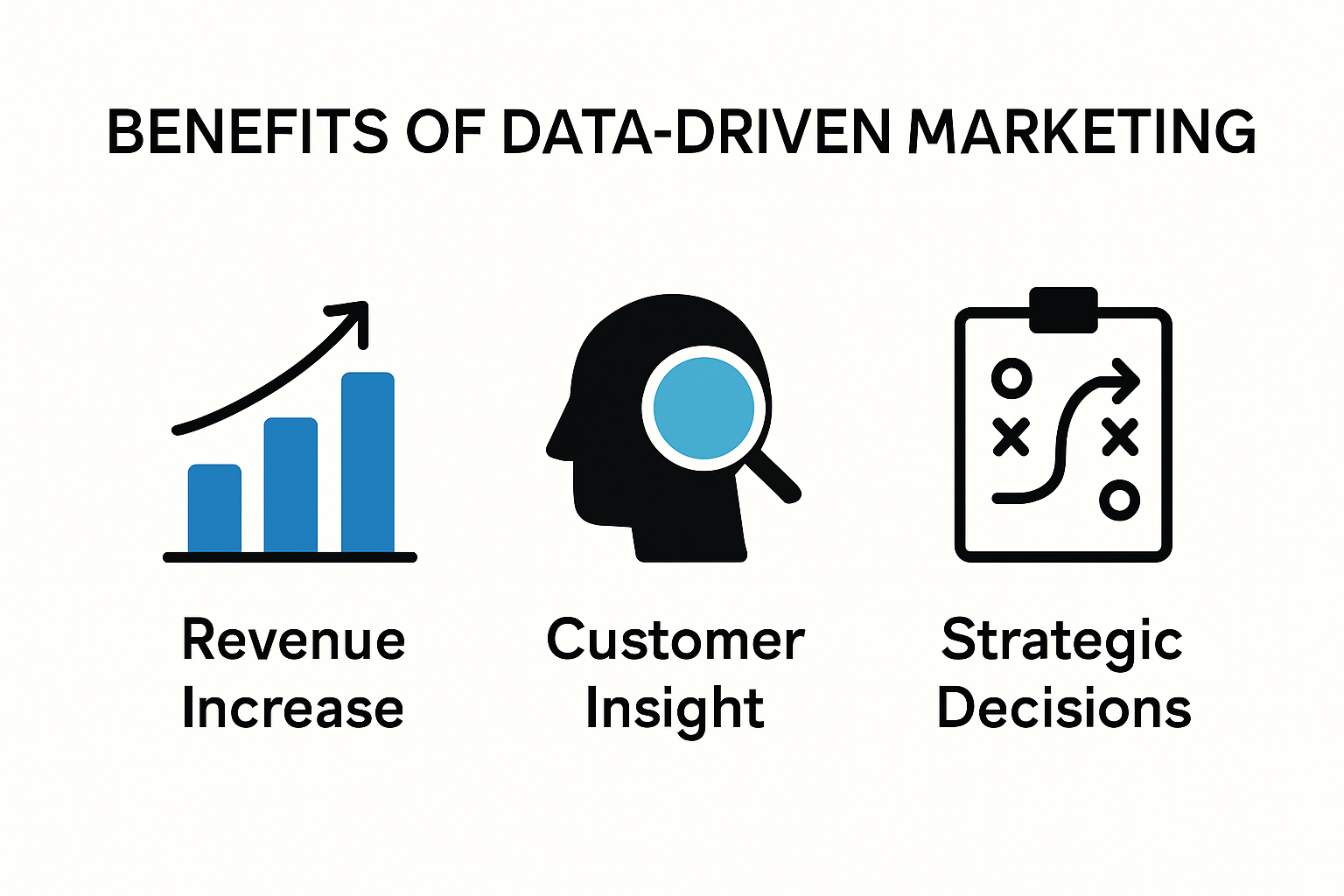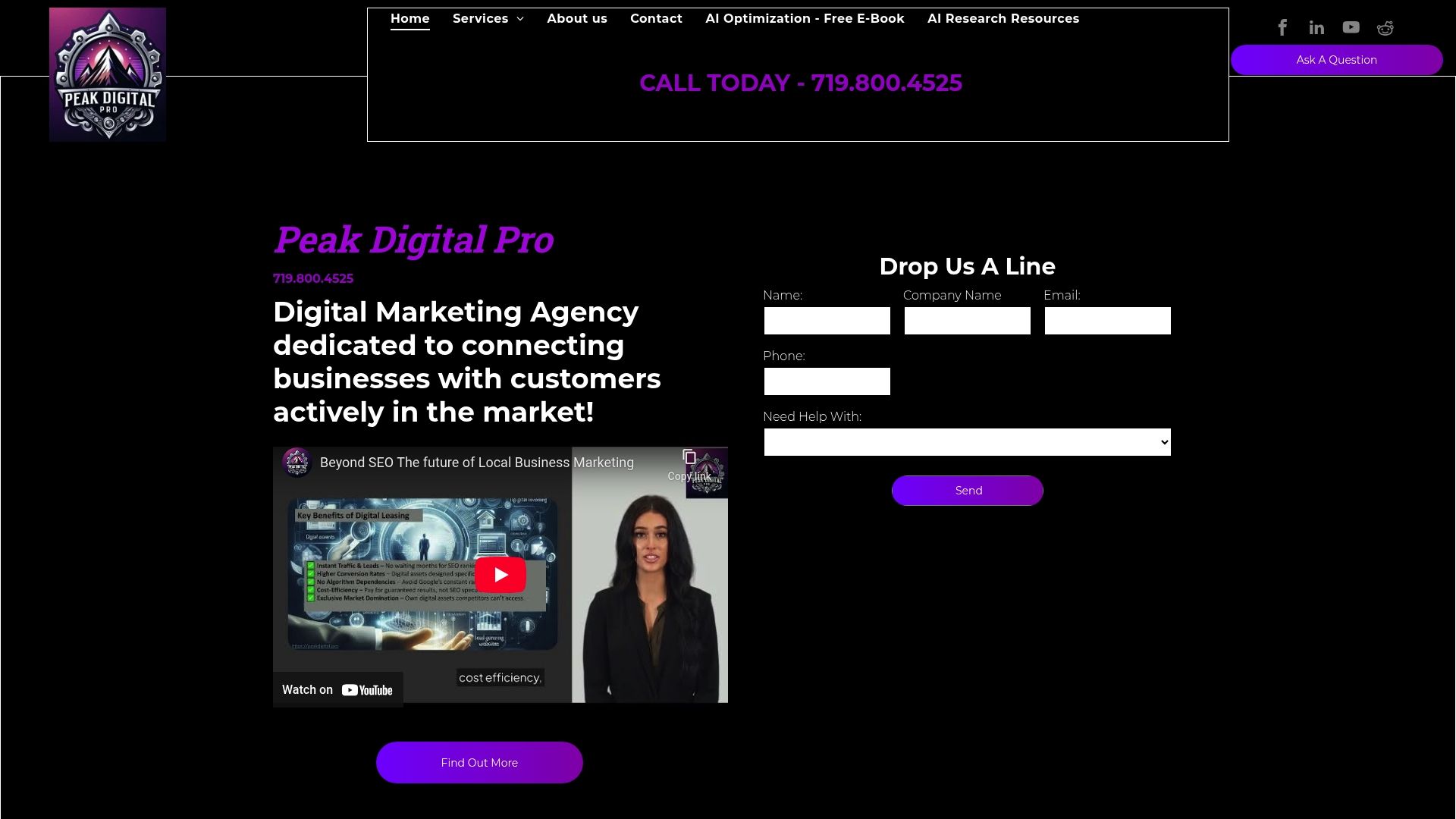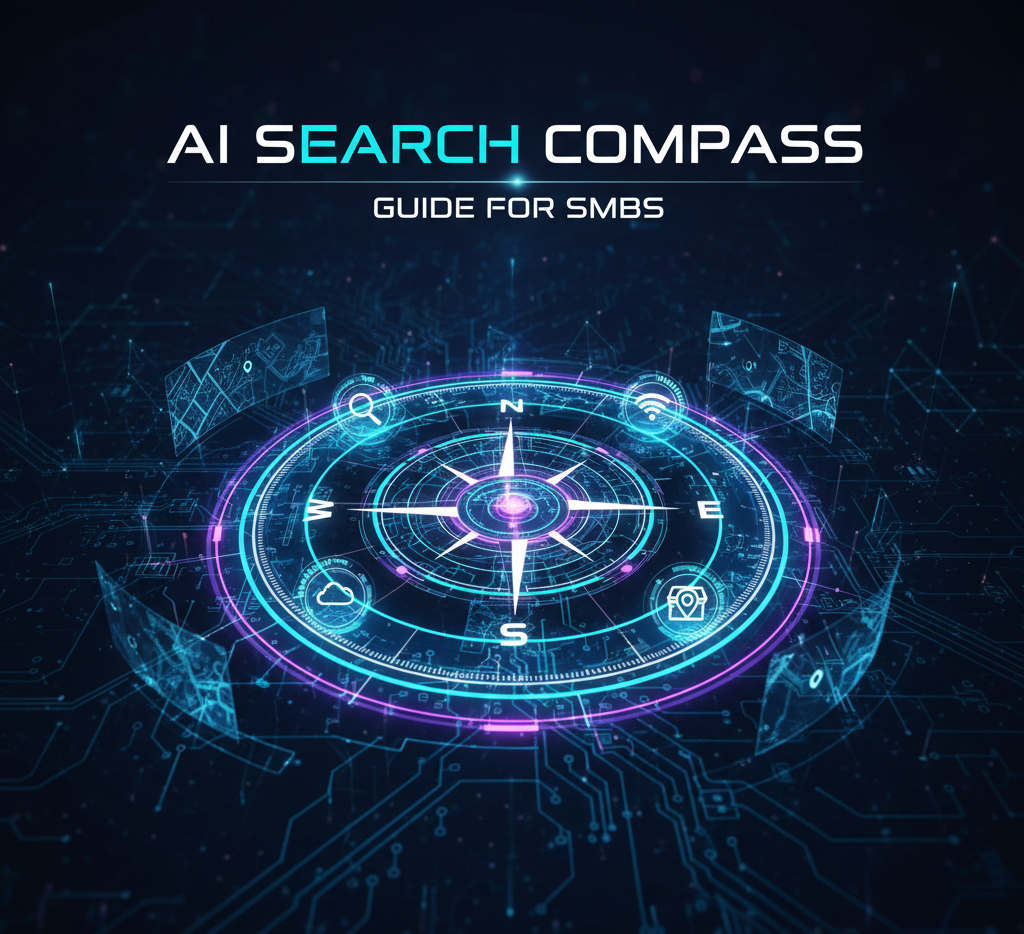Data-Driven Marketing Benefits for US Business Owners 2025

Businesses everywhere want to stay ahead, but the numbers behind data-driven marketing are jaw-dropping. Companies leveraging data-driven personalization see a 40 percent revenue jump over their competitors. Most think the secret lies in collecting piles of information. Turns out, the real breakthrough comes from how you transform everyday data into smart moves that shape the future of your business.
Table of Contents
Quick Summary
| Takeaway | Explanation |
|---|---|
| Data-Driven Personalization Fuels Revenue | Companies utilizing data-driven personalization can generate 40% more revenue than competitors, making it essential for growth strategies. |
| Smart Targeting Maximizes ROI | By employing advanced targeting techniques, businesses can refine audience segmentation, significantly enhancing engagement and conversion rates. |
| Investment in Technology is Critical | Developing effective data-driven marketing requires investment in technological infrastructure and analytical skills, which are crucial for interpreting data insights and executing strategies. |
| Addressing Data Challenges is Key | Businesses must confront data challenges such as quality issues and integration complexities, turning these into opportunities for competitive differentiation and better marketing outcomes. |
| Local Personalization Enhances Customer Connections | For Colorado businesses, leveraging local consumer insights and advanced personalization techniques can lead to substantial marketing ROI and stronger customer relationships. |
Driving Growth With Data Insights
Data has transformed from a passive record-keeping tool to a powerful strategic asset for businesses seeking competitive advantage. Modern business owners recognize that data-driven marketing benefits extend far beyond simple reporting, offering actionable insights that directly impact revenue and organizational performance.

Understanding Data Insights as a Growth Catalyst
Business growth no longer relies on intuition or traditional marketing approaches. According to McKinsey & Company , companies that leverage data-driven personalization strategies can generate 40% more revenue compared to their competitors. This statistic underscores the critical role of data in modern marketing strategies.
Data insights provide a multifaceted approach to understanding customer behavior, market trends, and potential growth opportunities. By analyzing complex datasets, businesses can:
- Predict Customer Behavior : Anticipate purchasing patterns and preferences
- Optimize Marketing Spend : Allocate resources more efficiently
- Identify Emerging Market Trends : Stay ahead of competitive shifts
To help visualize the benefits of leveraging data insights, the following table summarizes key advantages and their strategic business impact:
| Data Insight Benefit | Description | Strategic Value |
|---|---|---|
| Predict Customer Behavior | Anticipate purchasing patterns and preferences | Enables proactive marketing decisions |
| Optimize Marketing Spend | Efficient resource allocation | Maximizes ROI |
| Identify Emerging Market Trends | Detect new shifts in the marketplace | Maintains competitive advantage |
| Build Customer Profiles | Create detailed, dynamic personas | Enhances personalization |
| Real-Time Performance Tracking | Monitor campaign effectiveness instantly | Enables rapid adjustments |
Transforming Raw Data into Strategic Advantages
The power of data-driven marketing benefits lies not just in collection but in sophisticated interpretation. Harvard Business Review highlights that successful organizations treat data as a strategic asset, developing robust analytical frameworks that translate complex information into actionable business strategies.
Advanced analytics enable businesses to move beyond reactive approaches, creating proactive marketing strategies that anticipate customer needs. By integrating machine learning algorithms and comprehensive data analysis techniques, companies can develop highly targeted marketing campaigns that speak directly to specific customer segments.
Key components of effective data-driven marketing include:
- Comprehensive Customer Profiling : Creating detailed, dynamic customer personas
- Real-time Performance Tracking : Monitoring campaign effectiveness instantly
- Predictive Modeling : Forecasting potential market shifts and customer responses
Implementing a data-driven approach requires investment in both technological infrastructure and analytical talent. Business owners must view this not as an expense but as a strategic investment in future growth. The ability to quickly interpret and act on data insights can mean the difference between market leadership and irrelevance.
By embracing data-driven marketing strategies, businesses can transform raw information into a powerful competitive advantage, driving sustainable growth and creating more meaningful connections with their target audience.
Boosting ROI Through Smart Targeting
Smart targeting represents a revolutionary approach to marketing that transforms how businesses allocate resources and connect with potential customers. By leveraging advanced data analytics and precision targeting techniques, companies can dramatically improve their return on investment and create more meaningful marketing interactions.
Precision Targeting as a Revenue Optimization Strategy
Traditional marketing approaches often resemble casting a wide net, hoping to catch a few valuable customers. In contrast, smart targeting allows businesses to surgically approach specific customer segments with unprecedented accuracy. Research from ResearchGate reveals that data-driven marketing strategies can significantly enhance engagement rates and conversion potential by creating highly personalized communication channels.
The core principles of smart targeting involve:
- Granular Audience Segmentation : Breaking down customer groups into micro-segments
- Behavioral Pattern Analysis : Understanding specific customer interaction preferences
- Predictive Customer Modeling : Anticipating future purchasing behaviors

Advanced Targeting Techniques for Maximum Efficiency
A compelling study applied causal machine learning algorithms to assess marketing campaign effectiveness. According to research published in April 2022 , targeted coupon campaigns demonstrated significant variations in sales impact across different customer groups. This underscores the critical importance of developing nuanced, data-driven marketing strategies.
Effective smart targeting requires sophisticated analytical approaches that go beyond demographic information. Modern businesses must consider multiple dimensions such as:
- Purchase History : Understanding previous buying patterns
- Engagement Metrics : Tracking interactions across digital platforms
By integrating these comprehensive data points, businesses can create hyper-personalized marketing experiences that speak directly to individual customer needs and preferences.
Marketing teams must invest in robust analytics platforms capable of processing complex datasets and generating actionable insights. The goal is not just collecting information but transforming raw data into strategic marketing intelligence that drives measurable business growth.
Smart targeting is more than a technological solution it is a fundamental shift in how businesses approach customer relationships. By prioritizing precision, relevance, and personalization, companies can optimize their marketing spend and create more meaningful connections with their target audience.
The future of marketing belongs to those who can turn data into strategic advantage transforming potential customers from anonymous statistics into engaged, loyal brand advocates.
Personalization for Colorado Businesses
Personalization has emerged as a critical strategy for businesses seeking to differentiate themselves in an increasingly competitive marketplace. For Colorado businesses, leveraging data-driven personalization can transform customer interactions and drive significant growth across various industries.
The Local Advantage of Targeted Marketing
Colorado businesses have a unique opportunity to create deeply resonant marketing experiences by understanding local consumer behaviors and preferences. According to West Virginia University research , businesses implementing data-driven personalization strategies can achieve an impressive 58x return on marketing investment.
Local personalization strategies for Colorado businesses include:
- Geo-Targeted Campaigns : Designing marketing materials that reflect local cultural nuances
- Seasonal Relevance : Creating messaging that aligns with Colorado’s unique lifestyle and seasonal activities
- Community-Specific Messaging : Developing marketing approaches that resonate with local values and interests
To clarify the differences between standard and advanced personalization efforts for Colorado businesses, the following table summarizes techniques and their impact:
| Personalization Technique | Standard Approach | Advanced/AI-Driven Approach | Business Impact |
|---|---|---|---|
| Geo-Targeted Campaigns | General local offers | Hyper-localized, contextual messaging | Higher relevance, better response |
| Seasonal Relevance | Generic holiday/sale promotions | Data-driven alignment with local events | Increased engagement |
| Community-Specific Messaging | Broad regional targeting | AI-personalized messages by micro-segment | Stronger customer loyalty |
| Use of Behavioral Data | Past basic purchase data | Real-time multi-channel interaction tracking | Dynamic personalization |
| Predictive Modeling | Limited segmentation | AI-based future need and trend prediction | Proactive marketing |
Advanced Personalization Techniques
Research from AI marketing studies demonstrates that sophisticated personalization goes beyond basic demographic segmentation. Modern AI-driven technologies enable businesses to create highly precise customer profiles that predict individual needs and preferences with remarkable accuracy.
Effective personalization requires a multifaceted approach that considers:
- Behavioral Data : Tracking customer interactions and engagement patterns
- Contextual Insights : Understanding the broader environmental and cultural factors influencing customer decisions
- Predictive Modeling : Anticipating future customer needs and preferences
For Colorado businesses, personalization is not just a marketing technique but a strategic approach to building lasting customer relationships. West Virginia University communications research emphasizes that personalized marketing demonstrates a genuine understanding of individual customer needs, leading to increased satisfaction and loyalty.
The key to successful personalization lies in balancing technological sophistication with authentic human connection. Colorado businesses that master this approach can create marketing experiences that feel simultaneously cutting-edge and deeply personal.
By investing in advanced personalization technologies and strategies, local businesses can transform generic marketing interactions into meaningful conversations that resonate with their target audience. The result is not just improved marketing performance but the development of genuine, long-lasting customer relationships that drive sustainable business growth.
Overcoming Common Data Challenges
Data-driven marketing promises tremendous potential, yet businesses frequently encounter significant obstacles that can impede effective implementation. Understanding and strategically addressing these challenges is crucial for organizations seeking to maximize their data-driven marketing benefits.
Identifying Critical Data Infrastructure Barriers
According to McKinsey & Company , modern enterprises face complex challenges in transforming raw data into actionable marketing intelligence. The primary barriers often include fragmented data sources, insufficient analytical capabilities, and technological integration complexities.
Businesses typically encounter several fundamental data challenges:
- Data Quality Issues : Incomplete or inconsistent information
- Integration Complexity : Connecting disparate technological systems
- Analytical Skill Gaps : Limited internal expertise for advanced data interpretation
Strategic Approaches to Data Management
Successful data-driven marketing requires a comprehensive strategy that addresses technological, human, and procedural dimensions. Enterprises must develop robust frameworks that transform data from a potential liability into a strategic asset.
Key strategic interventions include:
- Modernizing Data Architecture : Implementing flexible, scalable technological infrastructure
- Continuous Workforce Upskilling : Developing internal analytical capabilities
- Establishing Robust Governance Protocols : Creating clear guidelines for data collection, storage, and utilization
The most effective organizations view data challenges not as insurmountable obstacles but as opportunities for strategic differentiation. By developing a proactive approach to data management, businesses can create competitive advantages that extend far beyond traditional marketing methodologies.
Advanced data strategies require significant investment in both technological infrastructure and human capital. Business leaders must recognize that overcoming data challenges is not a one-time effort but an ongoing process of continuous improvement and adaptation.
The future of marketing belongs to organizations that can effectively transform complex data streams into meaningful, actionable insights. Those who master this transformation will be positioned to create more personalized, responsive, and ultimately more successful marketing strategies.
By embracing a holistic approach to data management that balances technological innovation with strategic human insight, businesses can turn potential challenges into powerful opportunities for growth and customer engagement.
Frequently Asked Questions
What are the benefits of data-driven marketing for US business owners in 2025?
Data-driven marketing can lead to a 40% increase in revenue compared to competitors, enhance customer targeting, and improve marketing ROI by leveraging precise analytics.
How can small businesses implement data-driven marketing strategies?
Small businesses can start by investing in data collection tools, using customer insights for targeted advertising, and developing personalized marketing campaigns based on analytics.
What challenges do businesses face with data-driven marketing?
Common challenges include data quality issues, integration complexities between different data sources, and a lack of in-house analytical skills to interpret data effectively.
Why is personalization important in data-driven marketing?
Personalization allows businesses to craft targeted messages that resonate with individual customers, enhancing engagement and building stronger relationships, ultimately leading to higher customer satisfaction and loyalty.
Unlock the Real Value of Data-Driven Marketing for Your Business
It is frustrating when you collect valuable customer data but struggle to turn it into clear growth or higher sales. The article highlighted that many business owners miss out on the full power of data-driven marketing because of technical barriers, unclear analytics, or a lack of advanced tools. At Peak Digital Pro, we understand these roadblocks. Businesses across Colorado want to move beyond scattered campaigns and unlock targeted growth, deeper customer relationships, and smarter ROI. Expert personalization, local targeting, and AI-driven insights are no longer out of reach.

Why let missed opportunities hold you back any longer? Let our digital marketing experts in Colorado Springs guide you through the next wave of data-driven strategy. Explore how our web development, SEO, and advanced advertising solutions can help you dominate your market. See firsthand how our proven approach can transform raw data into measurable results. Take your next step to become a true local leader by visiting Peak Digital Pro today and unlock your company’s growth potential.








